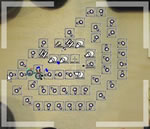Think you know the world around you? Try naming all 53 countries of the African continent in 10 minutes, in my latest naming game:
53 African Countries in 10 Minutes. Good luck.
Desktop Tower Defense

I think Desktop Tower Defense is the most fun and addicting flash game I’ve ever played. It’s awesome, but be warned, don’t even start if you have work to do, because the addictiveness is off the charts.
Subliminal Sound to “Cure” Video Game Addiction
A Korean venture start-up claims to have developed an audio sequence that can communicate with addicted game players below the conscious level. The company wants game manufacturers to play the embedded subliminal messages when a young user has kept playing after a preset period of time.
From The Korea Times article:
“We incorporated messages into an acoustic sound wave telling gamers to stop playing. The messages are told 10,000 to 20,000 times per second,” Xtive President Yun Yun-hae said.
“Game users can’t recognize the sounds. But their subconscious is aware of them and the chances are high they will quit playing,” the 35-year-old Yun said. “Tests tell us the sounds work.”
Any scholarly evidence I’ve ever read up on has indicated that subliminal messages don’t work, but apparently marketing such messages is big business.
Xtive applied for a domestic patent for the phonogram and is looking to take advantage of the technology in other sectors.
“We can easily change the messages. In this sense, the potential for this technology is exponential,” Yun said.
3 Way Tie on Jeopardy
I’ve been interested in learning more about Game Theory (wikipedia) lately and in particular The Prisoner’s Dilemma. One very interesting example happened on the Jeopardy show last Friday (March 16th 2007)—for the first time in 23 years, Jeopardy had a three way tie.
The tie was an anomaly in large part because one player didn’t play the game to win. Going into Final Jeopardy!, here’s how the totals stood…
- Scott: $13,400
- James: $8,000
- Anders: $8,000
So if you were playing the game, how much would you have bet? If you’re James or Anders, you can’t win by betting nothing and hoping for Scott to wager more than $5,400 and then get the question wrong because he won’t risk that much. In order for either James or Anders to win, you would have to bet everything, get the answer right and have Scott answer incorrectly.
If you’re Scott you have to wager at least $2,601 to win. It’s unlikely that you would get the question wrong and the other two get it right, so even with a really difficult question, chances are you’d still be left with between $10,799 or $8,001 depending on how aggressive you were—either way enough to beat either of your opponents who didn’t bet anything.
Scott probably assumed that one or both of his opponents would wind up with $16,000. What Scott did next is kind of like The Prisoner’s Dilemma (wikipedia) except that Scott was safe from either James or Anders “defecting”.
Scott decided to wager exactly $2,600 creating a three-way tie. He didn’t really lose anything because now he will return on Monday with the same two opponents that he’s already beaten and by not taking the extra $1 (or extra $2399 the most additional money he could have won with a “safe” wager) he allowed both James and Anders to also collect $1600 in winnings.
Scott has a Livejournal entry about the game:
Oh, you want to know about the Final Jeopardy! wager? It was an intentional bet. I counted on Anders and Jamey betting rationally and wagering everything. I thought it would be really cool to be a part of Jeopardy history. I knew that meant I’d be playing seasoned opponents, but it didn’t matter to me. I had already won a couple of games myself, and I thought it would be neat to share the money. (See my post about Jennifer from a couple of days; that’s what the literary people call foreshadowing. :-)). Now there’ll be a notation next to one of my games in the J! Archive. How cool is that?
(via Kottke)
Sprout
More than just a simple puzzle game, Sprout features beautiful charcoal drawings as the basis for its graphics and style—a flash game that thinks it’s a children’s storybook.
You Don’t Know Jack

I was first introduced to the game “You Don’t Know Jack” by my high school physics teacher almost ten years ago. On the last day of classes he let us chill out and play the addictive flash based game where high culture and pop culture collide; I’ve been a fan ever since.
Now you can play a single player version of You Don’t Know Jack online. You can also browse their older “Dis or Dat” games via their blog or after you finish the 7 question game.
Name Games
I’ve come up with a few more versions of the “name the provinces/states/countries” game. I’ll list them all here :
- Australian States
- Argentine Provinces
- European Union Member States
- Canadian Provinces and Territories
- African Countries
Have fun, don’t be shy, and let me know what you think and how well you did.
Nintendo Entertainment System Documentary
It’s hard to believe that the Nintendo Entertainment System was released 21 years ago. Last year, GameSpot sponsored a documentary celebrating the early years of Nintendo.
I particularly enjoyed the demonstrations of how to make your Nintendo cartridges run. I recall that for the first few years of Nintendo playing at our house we never had to blow on the games, I guess it was only in the later years (early 90’s) when games weren’t babied so much that dust was allowed to collect on the exposed circuit boards, and the ritual of blowing on games before you loaded them began.
Here it is, Flashback NES:
Hit play or watch fullscreen at Google Video.
Name 50 States in 10 Minutes or 13 Provinces and Territories in 2
Can you name 50 US states in 10 Minutes? Here’s a hint, if you get stuck think about the property names in Monopoly. I got 32 out of 50 on my first try.
I hope no one minds, but I converted the 50 States in 10 minutes game into a Canadian version: 13 Provinces and Territories in 2 minutes.
Update: See my list of other versions of the game.
Missing Link and Pictaps

Check out The Missing Link flash creation by interactive media artist Masayuki Kido. This is really cool. I don’t really have the words to summarize other than to say, it’s a series of silhouettes that appear and with the click of the mouse you can interact with them to see a near narrative unfold itself dynamically. I found it extremely compelling.
You might also want to check out Pictaps, another flash based diversion, on the same site, that allows you to draw a character, and then watch him dance to a silly song.